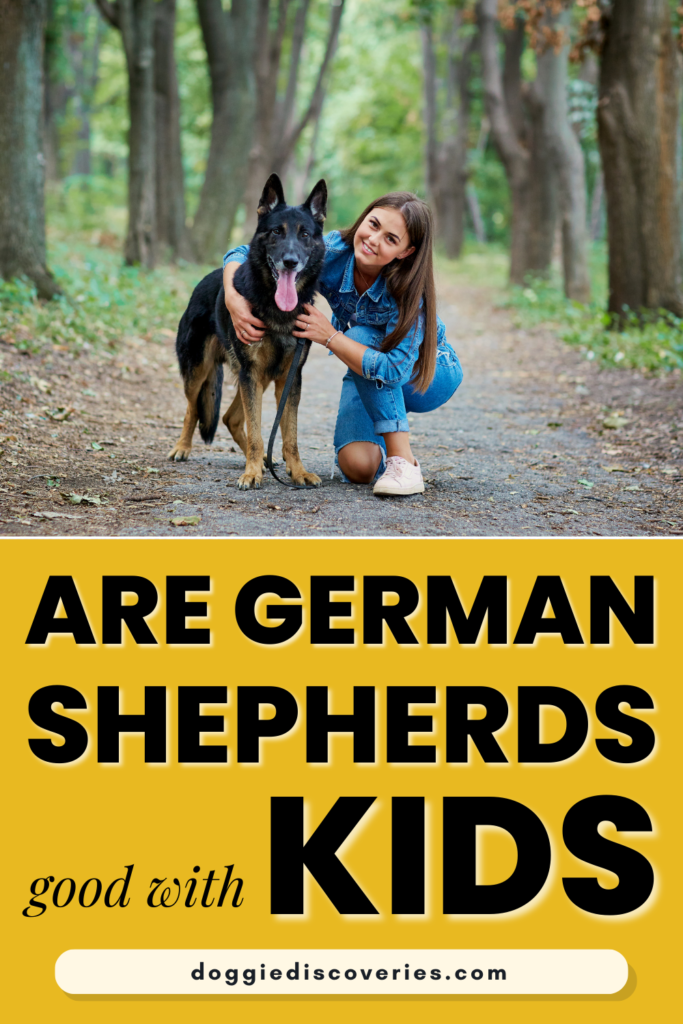Hence in selecting a family dog, one of the most important factors American families will consider is a breed that is safe for children.
As general large breeds friendly for families with children, often discussed German Shepherds is characterized by high levels of intelligence and loyalty, as well as versatility.
But are German Shepherds good with kids? It is time to describe their character, actions, and the measures that their owners should take in order to avoid conflict situations with children, to maximize cooperation between these wonderful dogs and kids.

What Should I Know About the German Shepherd’s Temperament
One of the favorite breeds for many Americans is the German Shepherd, and this is why.
Originally developed in Germany, they would have been used as practical working animals, and are known to be intelligent guard dogs, and highly versatile.
These appreciable qualities make them good partners but they bear certain duties.
The breed is obedient and protective, main towards their family. What this does is make them very protective of kids in the household and sometimes include them in what they refer to as their ‘herd’.
To their benefit, they are always attentive to duty and as such, patient while supervising children and also constantly vigilant due to their build.
German Shepherds are Friendly and Protective with Kids
The majestic German Shepherds are inherently protective and can efficiently protect young kids or babies.
It is with such knowledge that they can be code for alert and any perceived or foreseen danger to kids is always foiled by them.
This trait makes it easy for the parents to have rest of mind when their kids go out to play or even in new surroundings.
High Trainability
Out of all these features, education and quick understanding of commands are some of the most special in this breed.
Socialization and kind understanding make the German Shepherd obedient, respecting kid’s space, and behaving properly in different conditions.
Teaching them early and consistently will help them know how they fit in the family system.
Playfulness and Energy Levels
They are active dogs with lots of energy to play, thus perfect companions for the active child and family.
Whether playing with a ball for example practicing with a frisbee, running all over the yard or when with their families for hiking activities, such dogs do well in exercising settings which also challenge their brains.
Important Considerations
First of all, it is important to mention that German Shepherds are actually good with children, however,r there are a few points that should be taken into consideration to make the process enjoyable for each member of your family and the dog.
Early Socialization
Socialization is essential for any breed of dog, and it’s implicatively very important for German Shepherds.
Early in their training, these animals are exposed to children, other animals and other environments making them well-mannered and easily trainable to fit the yearnings of a master.
Size and Strength
German Shepherds are large dogs male is 65-90 lbs while the female is slightly smaller in size.
They are not vicious dogs and they play very gently with children, however, due to their large size and tremendous muscularity in their jaws they may inadvertently injure a child during play if the child is not supervised while playing with the puppy.
It may often be just as important to teach children how to approach and communicate with the dog correctly as it is to teach the dog.
Exercise Needs
It is a breed that needs adequate exercise since failure to do so will expose them to situations where they will bore, and this may lead to destruction.
Parents with young children should make sure they have an adequate amount of time to spend with the dog in order to be able to provide for its physical and mental activity.
How you can make your child and dog to be good friends
- START TRAINING EARLY: You should commence obedience training with a GSD at the earliest moment in their lives when you introduce him/her to your home environment. Commands taught include “sit”, “stay” and “gentle” which maximize on interaction with children.
- SUPERVISE PLAYTIME: Even though patient, the children, and their German shepherd are supervised as the dog as well as the child learns the appropriate behavior concerning the other.
- ENCOURAGE MUTUAL RESPECT: Tell the child not to run or shout around the dog, or tug the animal’s ears or tail, and to get off the animal if the dog seems uncomfortable.
- REWARD POSITIVE BEHAVIOR: Always reward when your child behaves well towards the dog and for the dog to behave well around the child.
Conclusion
Are German Shepherds child-friendly? Of course, if born and raised under appropriate stimuli in a well-cared-for and disciplined home.
This is due to their loyalty and intelligence, and their instinct to guard – which is useful when you’re having an active family. But, this being said, having a German Shepherd implies certain obligations.
This is why early socialization, appropriate training, and active coaching of children on how to treat the dog become critical for promoting a safe and healthy human-animal bond.
